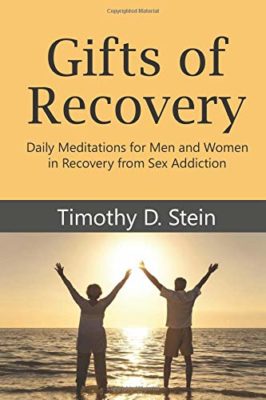By Tim Stein
Meditation from Gifts of Recovery.
The art of self-disclosure is an expression of the gift of courage.
–Wendy Behary
Self-disclosure is not easy. It brings the possibility of judgment and rejection. It is also the only way to find true love and acceptance. Effective self-disclosure is an expression of courage, the ability to do something that frightens us. When we are frightened, stopping is not the answer. Neither is denying our fear and throwing caution to the wind. Courage allows us to self-disclose with awareness of both the risks and the potential benefits.
When have I closed myself off from others out of fear? What have been the consequences of closing myself off from others? What gifts await me as I find true courage?
Many excellent addiction therapists have never struggled with their own addiction or had to consciously walk the path of recovery. These therapists know the disorder of addiction. They know the tools for creating sobriety. They know the importance of finding moderation in all things. They challenge, guide, support, and celebrate with their clients. They are excellent therapists. They cannot, however, draw from their personal experiences to inform and augment their other therapeutic assets in this work.
As wounded healers, we have our own personal experiences of addiction, sobriety, and recovery to draw from. While these experiences are not substitutes for solid clinical skills, they do give us more tools to apply in the support of others. We may use our experiences to support clients directly through appropriate self-disclosure or we may use our experiences indirectly to inform our clinical decisions.
Personally, I self-disclose to my clients that I am in my own recovery. I have had many clients say they are grateful to receive this information because they feel that I am more in tune with their struggles and better able to guide them in the journey. While we wounded healers have the advantage of not only knowing about the journey of sobriety and recovery but also taking this journey ourselves, we must be careful to not overlay our journeys onto our clients.
It can be damaging to a client if their therapist does not acknowledge or understand the client’s unique challenges. As a therapist, I can inflict this damage through a lack of clinical understanding or knowledge. I can also inflict this damage by viewing a client’s journey only through the lens of my own experiences. As wounded healers, we have both more tools to apply to our clinical work as well as another potential clinical pitfall to be aware of and manage.
If we choose to self-disclose our own sobriety and recovery experiences, there are a number of things we should keep in mind. We must ask ourselves:
- Is my purpose to benefit the client or to benefit myself?
- Will this particular client use this information in a way that is helpful?
- Will disclosing this information interfere with our therapeutic progress?
- Am I clear on my beliefs about self-disclosure?
- Am I getting my own help as needed so I do not spontaneously self-disclose for exploitative purposes of having clients meet my emotional needs?
If you choose to self-disclose, here are some experiences that you can share about your own sobriety and recovery that will help your self-disclosure stay firmly in the realm of benefitting the client:
- Share stories about your own experiences but do not share your story.
- Share your experiences of pain from the consequences of your addictive behaviors and choices.
- Share your realizations of unexpected benefits that come from continued sobriety and recovery.
- Share your own experiences of fear when faced with difficult steps or challenges related to sobriety and recovery work.
- Share your own experience of living in the middle of paradoxes (i.e., I must surrender to win).
While self-disclosure is only one way of using our personal recovery to benefit clients, it can be a powerful tool in our clinical work. It is important that we use it wisely.

